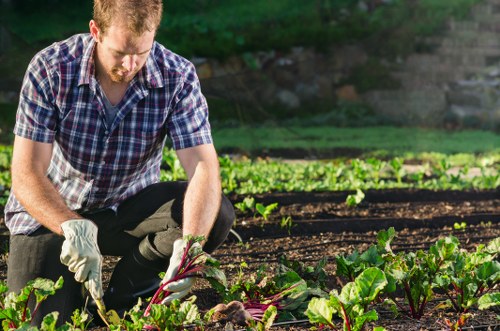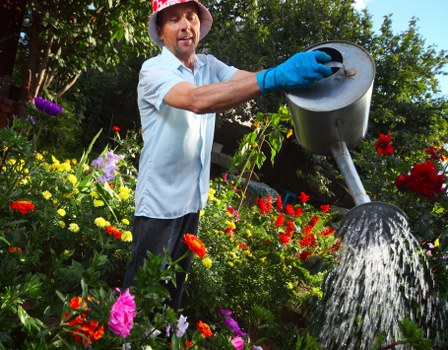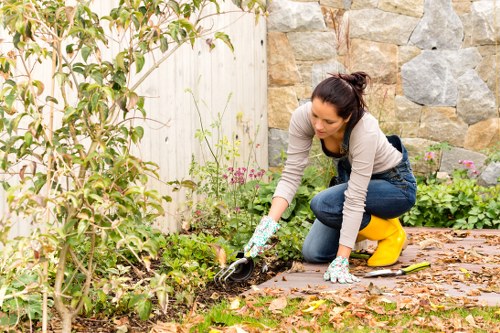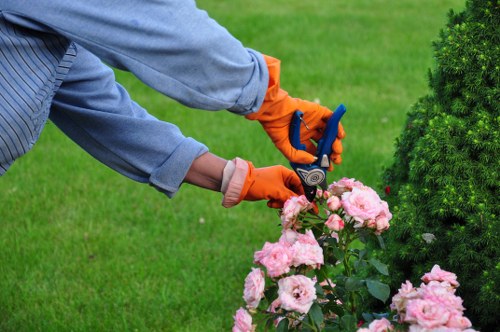Comprehensive Guide to Driveway Restoration in Church End

Driveway restoration is a crucial aspect of maintaining the curb appeal and functionality of your property in Church End. Over time, driveways can suffer wear and tear from weather conditions, heavy traffic, and regular use. Restoring your driveway not only enhances the aesthetic value of your home but also extends the lifespan of the pavement.
In Church End, homeowners have access to a variety of driveway restoration services tailored to meet different needs and budgets. Whether your driveway is made of asphalt, concrete, or paving stones, professional restoration can address cracks, potholes, and surface deterioration effectively.
Understanding the importance of timely driveway restoration can save you from costly repairs in the future. Regular maintenance and prompt attention to damage can prevent minor issues from escalating into major problems that require extensive work.
Why Choose Driveway Restoration?

Driveway restoration is often a more economical and environmentally friendly option compared to complete replacement. It involves several methods such as resurfacing, sealing, crack filling, and repaving, depending on the condition of your driveway.
Resurfacing, also known as overlaying, applies a new layer of pavement over the existing surface, which can significantly improve the appearance and durability of your driveway. Sealing helps protect the driveway from water damage, oil spills, and UV rays, extending its lifespan.
Crack filling addresses minor fissures in the pavement, preventing water from seeping in and causing further deterioration. These restoration techniques not only enhance the look of your driveway but also increase the overall value of your property.
Benefits of Driveway Restoration

There are numerous benefits to restoring your driveway. Some of the key advantages include:
- Cost-Effective: Restoration is generally more affordable than replacing the entire driveway.
- Enhanced Curb Appeal: A well-maintained driveway boosts the visual appeal of your home.
- Increased Property Value: A restored driveway can add significant value to your property.
- Durability: Restoration techniques improve the resilience of your driveway against weather and heavy use.
- Environmental Impact: Restoring your driveway reduces the need for new materials, making it a greener choice.
Common Driveway Problems in Church End

Church End homeowners may encounter various driveway issues that necessitate restoration services. Some of the most common problems include:
- Cracks and Fractures: These weaken the structural integrity of the driveway and can lead to further damage if not addressed.
- Potholes: Created by water erosion and freeze-thaw cycles, potholes are not only unsightly but also hazardous.
- Weeds and Vegetation: Growth between paving stones or cracks can cause instability and detract from the driveway's appearance.
- Discoloration: Fading or staining from oil spills and weather exposure can make the driveway look old and worn.
- Surface Wear: Regular use can lead to the smoothness of the driveway surface, making it slippery and less functional.
Signs You Need Driveway Restoration

Recognizing the signs that your driveway needs restoration is essential for timely maintenance. Some indicators include:
- Visible cracks or gaps in the pavement.
- Uneven surface that affects driving or walking.
- Discoloration or staining from spills or weather.
- Weeds growing through cracks or joints.
- Pooling water after rain, indicating poor drainage.
Driveway Restoration Process
The driveway restoration process in Church End involves several steps to ensure a durable and aesthetically pleasing result. Here's an overview of what to expect:
1. Assessment: A professional will inspect your driveway to determine the extent of the damage and recommend the appropriate restoration methods.
2. Cleaning: The driveway is thoroughly cleaned to remove dirt, debris, and existing stains, ensuring a proper bond for the restoration materials.
3. Repairing: Cracks and potholes are filled and repaired to create a smooth and stable surface.
4. Resurfacing or Repaving
Depending on the condition of the driveway, it may undergo resurfacing or complete repaving. Resurfacing involves adding a new layer of pavement, while repaving entails removing the old surface and laying new paving materials.
5. Sealing: After the repairs, a sealant is applied to protect the driveway from future damage and enhance its appearance.
6. Final Inspection: The restored driveway is inspected to ensure that all work meets quality standards and the desired outcome is achieved.
Choosing the Right Driveway Restoration Service in Church End
Selecting a reputable driveway restoration service is crucial for achieving the best results. Here are some factors to consider:
- Experience: Look for companies with a proven track record in driveway restoration.
- Portfolio: Review their previous work to assess the quality and style of their restorations.
- Customer Reviews: Read testimonials and feedback from past clients to gauge satisfaction levels.
- Warranty: Ensure that the service provider offers a warranty on their workmanship and materials.
- Pricing: Compare quotes from different companies to find a service that fits your budget without compromising quality.
Questions to Ask Potential Contractors
When contacting driveway restoration companies, consider asking the following questions:
- What restoration methods do you recommend for my driveway's condition?
- Can you provide references or examples of similar projects?
- What is the estimated timeline for the restoration process?
- Do you offer any guarantees or warranties on your work?
- How do you handle unexpected issues that may arise during the project?
Cost of Driveway Restoration in Church End
The cost of driveway restoration in Church End varies based on several factors, including the size of the driveway, the extent of damage, and the chosen restoration method. On average, homeowners can expect to pay between £3,000 and £6,000 for a complete driveway restoration.
Resurfacing tends to be more affordable, while repaving can be more expensive due to the removal and replacement of existing materials. It's essential to obtain detailed quotes from multiple service providers to understand the cost breakdown and make an informed decision.
Investing in high-quality materials and skilled labor may result in higher upfront costs but can provide better durability and long-term savings by reducing the need for frequent repairs.
Financing and Payment Options
Many driveway restoration companies in Church End offer flexible financing and payment plans to accommodate different budgets. It's advisable to discuss payment options with your chosen contractor to ensure that the restoration project is financially manageable.
- Payment Plans: Spread the cost over several months to ease financial burden.
- Financing Options: Some companies offer financing through third-party lenders.
- Upfront Discounts: Inquire about any discounts for full upfront payments.
Maintenance Tips After Driveway Restoration
Proper maintenance after driveway restoration can significantly extend its lifespan and keep it looking new. Here are some tips for maintaining your restored driveway:
- Regular Cleaning: Sweep the driveway regularly to remove debris and prevent staining.
- Seal Coating: Apply a sealant every few years to protect against weather and spills.
- Prompt Repairs: Address any new cracks or damage immediately to prevent further deterioration.
- Weed Control: Remove weeds and vegetation promptly to maintain the integrity of the pavement.
- Avoid Heavy Loads: Limit the weight on your driveway by not parking heavy vehicles frequently.
Seasonal Care
Different seasons require specific care to maintain your driveway:
- Winter: Clear snow and ice promptly to prevent water damage from freeze-thaw cycles.
- Spring: Inspect for damage caused by winter weather and apply sealant if necessary.
- Summer: Keep the driveway clean from spills and perform regular weeding.
- Autumn: Prepare the driveway for winter by sealing any new cracks and ensuring proper drainage.
Local Areas Near Church End for Driveway Restoration
Driveway restoration services in Church End also cater to nearby areas, ensuring that homeowners across the region have access to quality maintenance. Here are some of the closest areas:
- Hampstead Heath: Just a short drive away, this area benefits from scenic views and reliable restoration services.
- Highgate: Known for its historic charm, Highgate residents can maintain their driveways with professional services.
- Finchley Road: Located close to Church End, Finchley Road offers quick and efficient driveway restoration solutions.
- Golders Green: With its vibrant community, Golders Green is a popular area for driveway enhancements.
- West Hampstead: West Hampstead homeowners enjoy access to top-tier restoration experts.
- Tufnell Park: Tufnell Park provides its residents with reliable maintenance and restoration options.
- Muswell Hill: Known for its beautiful homes, Muswell Hill requires meticulous driveway care.
- East Finchley: East Finchley offers a range of services to keep driveways in excellent condition.
- Crouch End: Crouch End's picturesque streets benefit from regular driveway restoration.
- West Finchley: West Finchley residents have access to comprehensive driveway maintenance services.
- Broke Hall: Nearby Broke Hall ensures that driveways are restored with attention to detail.
- New Southgate: New Southgate homeowners can rely on professional restoration for their driveways.
- Totteridge: Totteridge's elegant properties are complemented by well-maintained driveways.
- Pregents Hill: Pregents Hill offers specialized services to cater to unique driveway needs.
- Petersham: Although slightly farther, Petersham still benefits from Church End's restoration expertise.
Choosing Sustainable Driveway Restoration Practices
Embracing sustainable practices in driveway restoration not only benefits the environment but also ensures long-term durability. Here are some eco-friendly approaches:
- Recycled Materials: Using recycled asphalt or concrete reduces waste and lowers the environmental impact.
- Permeable Paving: Allows water to seep through, reducing runoff and promoting groundwater recharge.
- Energy-Efficient Processes: Utilizing energy-efficient machinery and techniques minimizes carbon footprint.
- Non-Toxic Sealants: Choosing eco-friendly sealants prevents harmful chemicals from entering the environment.
- Local Sourcing: Sourcing materials locally reduces transportation emissions and supports the local economy.
Benefits of Sustainable Restoration
Adopting sustainable driveway restoration practices offers multiple benefits:
- Environmental Protection: Reduces pollution and conserves natural resources.
- Cost Savings: Sustainable materials often last longer, reducing the need for frequent repairs.
- Community Health: Minimizes exposure to harmful chemicals, promoting a healthier environment.
- Regulatory Compliance: Meets local environmental regulations and standards.
- Enhanced Property Value: Eco-friendly upgrades can increase the value and appeal of your property.
Conclusion
Driveway restoration in Church End is a valuable investment that enhances both the appearance and functionality of your property. By addressing common issues such as cracks, potholes, and surface wear, restoration services ensure a durable and attractive driveway that stands the test of time.
Choosing the right restoration method and a reputable service provider is essential for achieving the best results. Additionally, incorporating sustainable practices can provide long-term benefits for both your property and the environment.
Regular maintenance and timely attention to driveway issues will prolong its lifespan, saving you money and effort in the long run. Whether you live in Church End or the surrounding areas, professional driveway restoration services are available to meet your needs and elevate your home's curb appeal.
Frequently Asked Questions
1. How long does driveway restoration take?
Driveway restoration typically takes between one to three days, depending on the size of the driveway and the extent of the damage. Larger or more damaged driveways may require additional time for thorough repairs and drying.
2. How much does driveway restoration cost in Church End?
The cost varies based on factors such as driveway size, material, and the extent of repairs needed. On average, homeowners can expect to spend between £3,000 and £6,000 for a complete restoration.
3. Can I restore my driveway myself?
While minor repairs like filling small cracks can be DIY projects, professional driveway restoration ensures a durable and high-quality finish. Experts have the necessary tools and expertise to address complex issues effectively.
4. How often should I have my driveway restored?
It's recommended to consider restoration every 10-15 years, or sooner if you notice significant wear and tear. Regular maintenance can help extend the lifespan of your driveway and prevent costly repairs.
5. What materials are used in driveway restoration?
Common materials include asphalt, concrete, and paving stones. The choice of material depends on your existing driveway, budget, and desired aesthetic. Professionals can guide you in selecting the best option for your needs.


